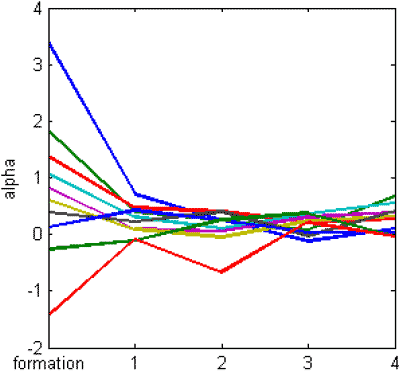Can investors count on continued outperformance from hedge funds with exceptionally strong recent returns? In their July 2008 paper entitled “The Performance Persistence of Equity Long/Short Hedge Funds”, Markus Schmid and Samuel Manser apply a flexible portfolio-based approach to investigate the persistence of raw and risk-adjusted returns for long/short equity hedge funds. Using return and holdings data for 1,150 long/short equity hedge funds over the period 1994-2005, they conclude that:
- Raw returns show very little persistence on an annual basis. Funds with the highest raw returns last year exhibit insignificant outperformance the next year and no persistence in returns beyond the next year.
- Risk-adjusted return measures such as Sharpe ratio, beta and especially alpha are more persistent than raw returns.
- Funds with high recent four-factor (market, size, book-to-market, momentum) alphas are unlikely to have a low alpha the next year. High alphas do not persist beyond one year, but the lowest alphas persist for two years.
- A portfolio comprised of the tenth of funds with the highest alphas over the past two years, rebalanced annually, generates a significant monthly alpha of 0.71%.
- Funds with significantly high risk-adjusted returns tend to have relatively low exposure to the market, high raw returns and low volatilities.
The following chart, taken from the paper, shows the alphas of ten portfolios of long/short equity hedge funds sorted on alpha achieved over the two years before formation. Most of the differences in past performance disappear after portfolio formation. However, abnormal performance persists significantly over one year for the top-performing portfolio and two years for the bottom-performing portfolio. Results demonstrate that the top-performing portfolio must be reformed annually to capture persistence over time.

In summary, long/short equity hedge fund investors, if they have the flexibility, may be to able capture future alpha by chasing past alpha.